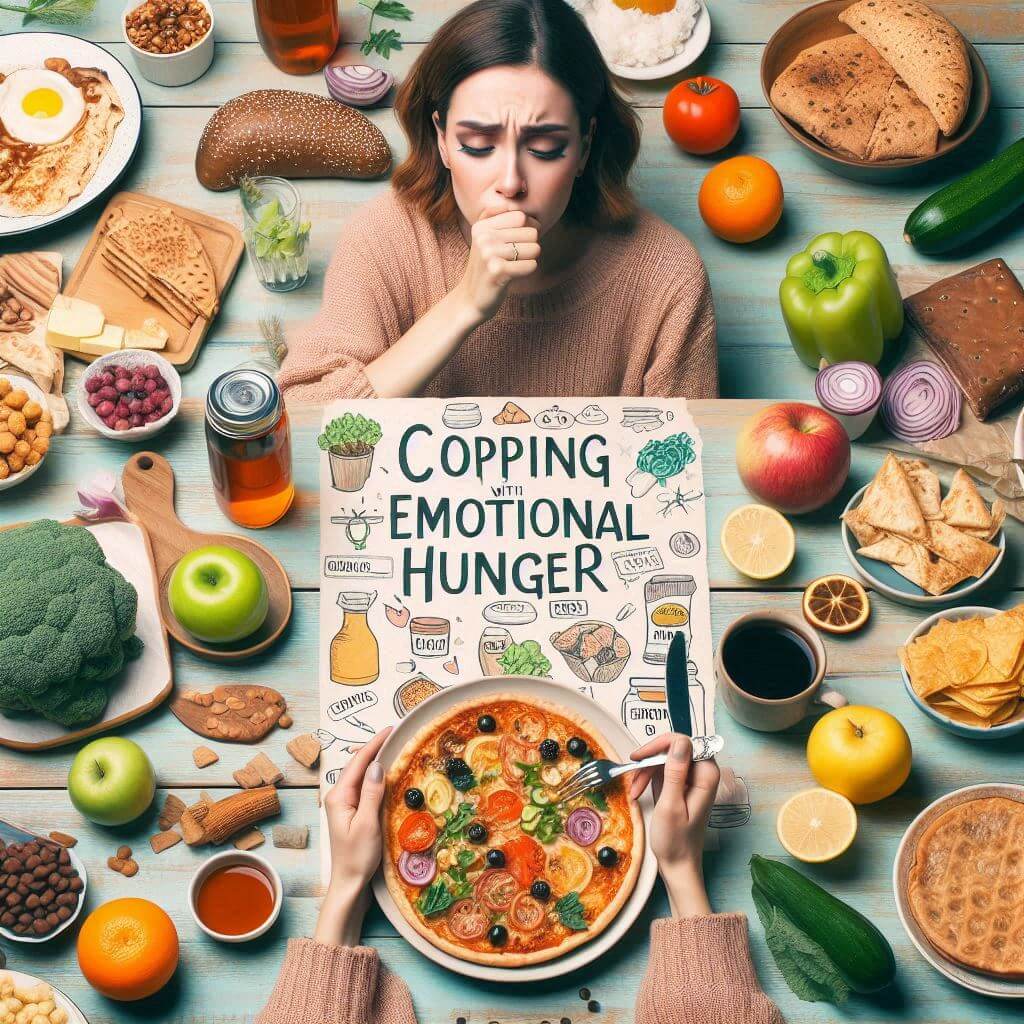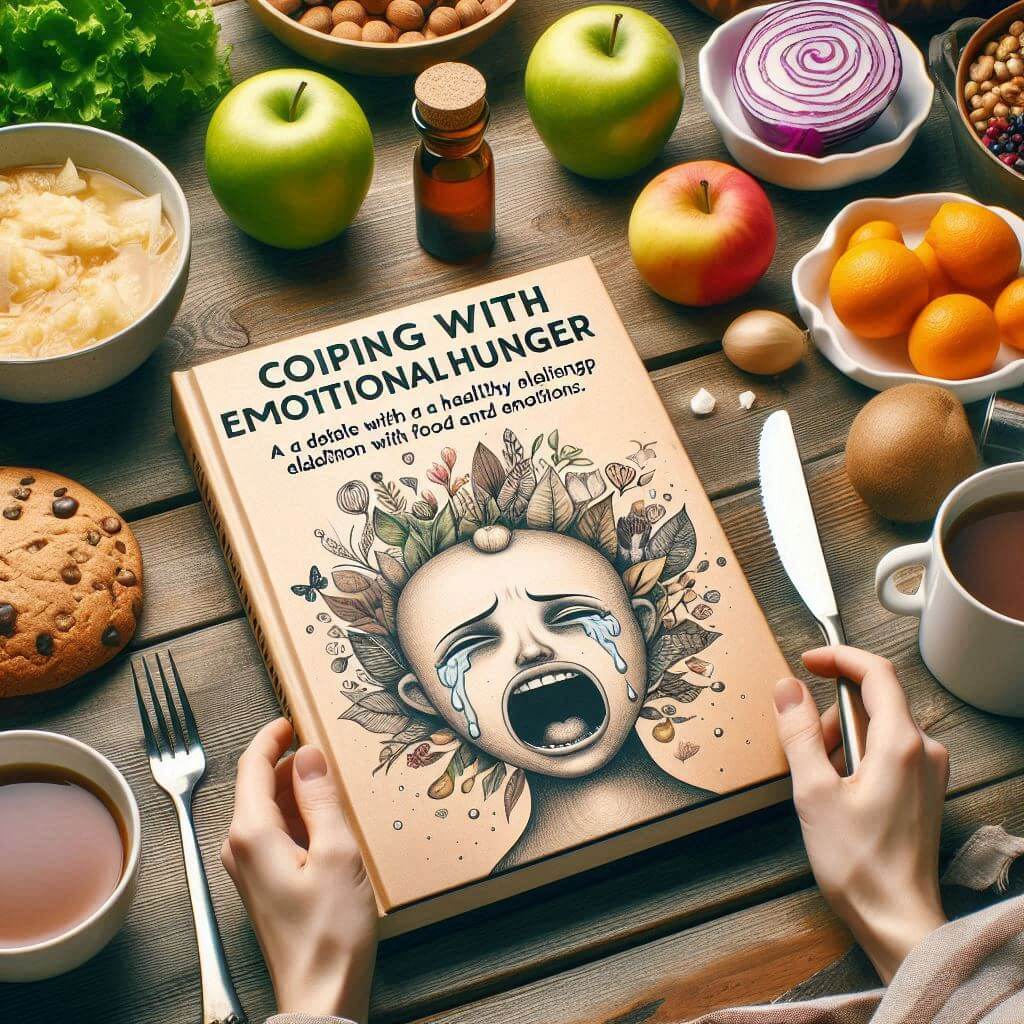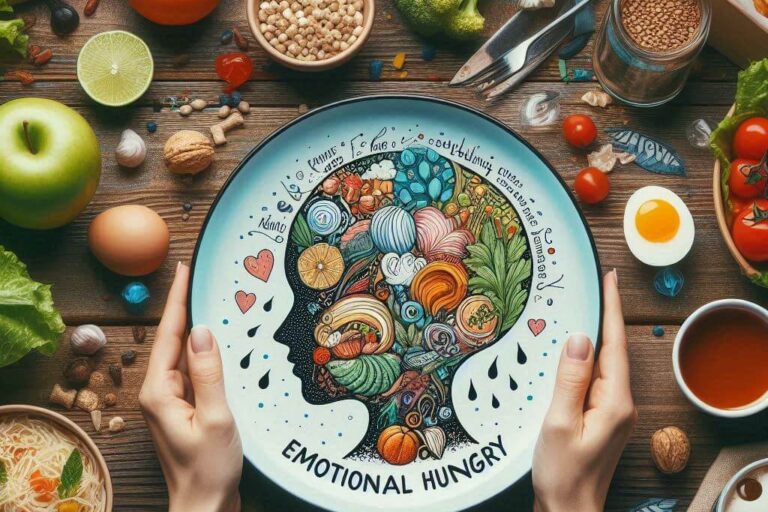The relationship between food and emotions is complex and goes beyond simple satiety. Eating can also be a mechanism for dealing with various emotions, such as stress, sadness, anxiety or boredom.
When this happens, the emotional hunger comes into play, leading to eating patterns harmful and hindering efforts for a nutritional reeducation.
In this detailed guide, we will explore strategies for identify and manage emotional hunger effectively, building a more healthy with food and with your emotions.
Understanding Emotional Hunger in Depth:
Emotional hunger is characterized by a sudden and intense desire to eat, usually accompanied by a specific will for comfort foods, such as sweets, snacks or foods rich in fat.
- “Emotional hunger: the relationship between emotions and food”
Unlike physical hunger, which comes on gradually and can be satisfied by any type of food, emotional hunger is linked to a sudden impulse and specific to eat for dealing with uncomfortable emotions.
These emotions vary from person to person and according to the situation. Some use food as a reward or celebration, while others see it as a distraction or temporary stress relief.
It is important to remember that eating for emotional reasons rarely solves problems and can even make them worse in the long run.
Identifying Emotional Hunger Accurately:

The first step to managing emotional hunger is learning how to recognize the signs which indicate that you are eating for emotional reasons, not physical hunger.
Some strategies to help you:
- Advanced Emotional Self-Awareness: Pay attention to your feelings and emotions in different situations, noticing whether you tend to turn to food to cope with them.
- Question Your Motives in Detail: Before eating, ask yourself if you are really physically hungry or if you are trying to satisfy an emotional need. Consider whether the urge to eat came after a stressful event, a moment of sadness or boredom, for example.
- Differentiate between Physical and Emotional Hunger with Concrete Examples: Physical hunger usually develops gradually and may be accompanied by physical symptoms such as a rumbling stomach or weakness. Emotional hunger, on the other hand, appears suddenly and is associated with a specific desire for certain foods. Imagine, for example, feeling a sudden craving for chocolate after a hard day's work, or wanting to eat something sweet after a disappointment.
- Keep a Detailed Food and Emotional Diary: Record what you eat, how you feel before and after meals, and the situations that led you to eat. Write down details of your emotions, the type of food you ate and the amount, to identify patterns and emotional triggers.
Managing Emotional Hunger with Effective Strategies:
When identifying emotional hunger, it is crucial to develop healthy strategies to deal with emotions without resorting to food.
Some suggestions:
- Practice Emotional Self-Regulation with Various Techniques: Instead of using food as an outlet, try relaxation techniques like deep breathing, meditation, yoga, or listening to calming music. You can also engage in relaxing activities like reading, painting, gardening, or taking a warm bath. If you feel the need, talk to a trusted friend or family member, or seek professional help from a therapist.
- Find Healthy and Enjoyable Alternatives: Look for healthy and enjoyable ways to deal with emotions, such as physical exercises (walking, swimming, dancing), outdoor activities (picnics, walks in the park), hobbies (music, painting, crafts), or engaging in social activities (meetings with friends, support groups).
- Set Custom Limits: If certain foods cause you to eat for emotional reasons, consider limiting or avoiding them in certain situations. For example, if you usually eat sweets after work, avoid having them at home or in the office.
- Seek Professional Support if Needed: If you are struggling to manage emotional eating on your own, seek help from a mental health professional.
- Neurobiology of emotional hunger and obesity: A review.
Emotional Triggers: Uncovering Stressors

Understand the emotional triggers that trigger emotional eating is critical to developing effective coping strategies. These triggers can vary widely between individuals and situations.
Some common examples of emotional triggers include:
- Stress: Pressures at work, financial problems, personal conflicts can lead to the use of food as a form of temporary relief.
- Anxiety: Feelings of worry, insecurity, or nervousness can trigger the desire to eat to calm the mind.
- Sadness: Loss, disappointment or feelings of loneliness can lead to seeking comfort in food.
- Premenstrual tension (PMS): Hormonal changes can increase cravings for certain foods.
- Loneliness: Feelings of isolation can lead to seeking companionship through food.
- Happiness and Celebration: Joyful events can be associated with food as a reward or celebration.
Identifying your personal triggers is crucial. Observe your emotions before eating and try to identify patterns. This will allow you to develop specific strategies to deal with each emotional trigger.
For example:
- If stress is your trigger, relaxation techniques like meditation or yoga may be beneficial.
- If loneliness is a problem, seeking out social activities or connecting with friends can help.
- If PMS is a factor, planning healthy meals and having healthy snack options on hand can be helpful.
Remember:
- Every person is unique: What triggers emotional hunger in one person may not affect another.
- Multiple triggers: It is common to have multiple emotional triggers.
- Awareness is key: Learning to identify your triggers is the first step to overcoming them.
Cultivating a Healthy Relationship with Food and Emotions
Overcoming emotional hunger is not just about changing eating habits, but also about cultivate a more conscious and balanced relationship with food and emotions.
Some additional tips:
- Patience and Self-Compassion: Changing habits takes time. Be kind to yourself during the process.
- Food Balance: Prioritize a balanced diet with essential nutrients to provide energy and satisfaction.
- Body Listening: Learn to differentiate between physical and emotional hunger. Pay attention to your body's signals.
- Seeking Support: Sharing your experiences with friends, family, or a healthcare professional can be very valuable.
- Non-Food Celebration: Find other ways to celebrate achievements or deal with positive emotions, such as spending time with loved ones, pursuing hobbies, or exercising.
Remember:
- The journey is individual: What works for one person may not work for another. Experiment with different strategies until you find what works best for you.
- Professionals can help: Nutritionists and psychologists can offer specialist support.
By developing effective strategies for dealing with emotional eating, you will be taking an important step toward a healthier relationship with food and greater emotional well-being.
Diving deeper into emotional triggers and their nuances:

Uncovering Individual Emotional Triggers:
The journey to overcoming emotional eating begins with the self-knowledge.
Remember:
- Every individual is unique: What triggers one person may not trigger another.
- Combination of factors: It is common to have a combination of emotional triggers that contribute to emotional eating.
- Identification is essential: Recognizing your personal triggers is the first step to developing effective management strategies.
Exploring Custom Strategies:
Here are some tips to help you uncover your emotional triggers:
- Emotional Food Diary: Write down what you eat, when you eat it, and how you feel before, during, and after eating. Include details about your emotions, the environment, and events that may have influenced your eating behavior.
- Mindfulness and Self-Awareness: Practice mindfulness to identify your thoughts and feelings in real time. Notice how your emotions change throughout the day and how this may relate to your desire to eat.
- Identify Patterns: By reviewing your emotional eating diary, you can begin to identify patterns between your emotions, triggers, and eating behaviors. This will give you clues about what situations or emotions trigger you to eat for emotional reasons.
- Be honest with yourself: This process can be challenging and requires honesty with yourself. Don’t judge yourself, just observe your patterns without criticizing them.
Remember:
- The journey is individual: The time it takes to identify your triggers and develop effective strategies varies from person to person. Be patient and persistent.
- Small steps: Start with small changes and gradually adjust your behavior according to your needs.
- Celebrate your victories: Recognize and celebrate your progress, no matter how small. This will motivate you to continue on your journey.

Addressing Common Emotional Triggers:
Here are some tips for dealing with some common emotional triggers:
- Stress: Practice relaxation techniques such as deep breathing, meditation, yoga, or physical activity. Organize your tasks and establish healthy boundaries at work and in your personal life.
- Anxiety: Find activities that calm you, such as listening to relaxing music, reading a book, or spending time in nature. If your anxiety is intense, seek professional help.
- Sadness: Talk to friends, family, or a mental health professional. Engage in activities that bring you joy and fulfillment.
- Premenstrual tension: Plan healthy meals in advance and have nutritious snack options on hand. Drink plenty of water and exercise. exercises physical regularly.
- Loneliness: Connect with friends and family, join interest groups, or volunteer.
- Happiness and Celebration: Find other ways to celebrate achievements or deal with positive emotions, such as spending time with loved ones, pursuing hobbies, or exercising.
Remember:
- There is no one-size-fits-all solution: What works for one person may not work for another. Experiment with different strategies until you find what works best for you.
- Professional help: If you are struggling to deal with your emotional triggers on your own, seek help from a psychologist, nutritionist, or other qualified health professional.
Cultivating a Healthy Relationship with Food and Emotions:
Overcoming emotional hunger goes beyond just changing your eating habits. It’s about cultivating a more conscious and balanced relationship with food and your emotions.
Some additional tips:
- Practicing Mindful Eating: Eat mindfully, without distractions, savoring each bite and recognizing the signs of satiety.
- Respect Physical Hunger: Allow yourself to feel hungry and eat when you are truly hungry. Avoid skipping meals or going for long periods of fasting.
- Choose Nutritious Foods: Prioritize whole foods, fruits, vegetables, greens and proteins lean. Limit your intake of processed foods, sugars and fats saturated.
- Cooking at Home: Cooking at home allows you to have more control over the ingredients and quality of your food. Try new recipes
| Question | Response |
|---|---|
| What is emotional hunger? | Emotional hunger is a sudden and intense desire to eat, usually to cope with uncomfortable emotions such as stress, sadness, anxiety or boredom, as opposed to physical hunger which comes on gradually and can be satisfied by any type of food. |
| How can I identify if I am eating for emotional reasons? | Note whether the urge to eat comes on suddenly, is specific to certain comfort foods, and is linked to stressful emotions or situations. Keeping a food and emotional diary can help identify patterns and triggers. |
| What are some strategies for managing emotional eating? | Practice relaxation techniques like deep breathing, meditation, or yoga, find enjoyable activities like exercise or hobbies, set limits on trigger foods, and seek professional support if needed. |
| What are emotional triggers and how to identify them? | Emotional triggers are situations or emotions that trigger emotional eating. Examples include stress, anxiety, sadness, PMS, loneliness, and celebration. Identify these by noticing your emotions before eating and keeping a food and emotional diary. |
| How to differentiate physical hunger from emotional hunger? | Physical hunger develops gradually and can be satisfied by any food, while emotional hunger appears suddenly and is associated with a specific desire for certain foods. Pay attention to your body's signals, such as a rumbling stomach or weakness. |
| What should I do if I identify that I am eating out of emotions? | When you identify emotional hunger, practice emotional self-regulation with relaxation techniques, find healthy alternatives to cope with emotions, and set limits on trigger foods. Seek professional support if necessary. |
| What are some examples of common emotional triggers? | Stress, anxiety, sadness, PMS, loneliness, and celebration are common emotional triggers. Identifying and understanding your personal triggers is crucial to developing effective coping strategies. |
| How can I cultivate a healthier relationship with food and emotions? | Practice the food Be mindful, respect your physical hunger, choose nutritious foods, cook at home to have control over the ingredients, and be patient with yourself during the process of changing habits. |
| What is the role of mindful eating in managing emotional hunger? | Mindful eating involves paying full attention to meals, savoring each bite, and recognizing hunger and fullness cues, promoting a healthier relationship with food and improving digestion and satisfaction. |
| How to seek professional help for emotional hunger? | If you are struggling to manage emotional eating on your own, seek help from a psychologist, nutritionist or other qualified health professional who can offer expert support and personalized strategies. |
This table provides quick and practical answers to the most common questions about emotional hunger and the relationship between food and emotions.









